 MyDogBreeds
MyDogBreeds Galgo Espanol is originated from Spain but Dalmador is originated from United States. Galgo Espanol may grow 9 cm / 4 inches higher than Dalmador. Both Galgo Espanol and Dalmador are having almost same weight. Both Galgo Espanol and Dalmador has almost same life span. Both Galgo Espanol and Dalmador has same litter size. Galgo Espanol requires Low maintenance. But Dalmador requires Moderate maintenance
Galgo Espanol is originated from Spain but Dalmador is originated from United States. Galgo Espanol may grow 9 cm / 4 inches higher than Dalmador. Both Galgo Espanol and Dalmador are having almost same weight. Both Galgo Espanol and Dalmador has almost same life span. Both Galgo Espanol and Dalmador has same litter size. Galgo Espanol requires Low maintenance. But Dalmador requires Moderate maintenance
 Galgo Espanol means Spanish with galgo meaning greyhound, thus a Spanish Greyhound. This breed is ancient with their roots in perhaps the English greyhound and others in the sighthound family. They are much like the greyhound in that they are laid back, calm, gentle and quiet, unless they are competing on the local track. Like the greyhound they are shy and reserved; great with kids and other pets. And of course, they love cats.
Galgo Espanol means Spanish with galgo meaning greyhound, thus a Spanish Greyhound. This breed is ancient with their roots in perhaps the English greyhound and others in the sighthound family. They are much like the greyhound in that they are laid back, calm, gentle and quiet, unless they are competing on the local track. Like the greyhound they are shy and reserved; great with kids and other pets. And of course, they love cats.
There are dogs like the Galgo referred to in writing by the ancient Celts and Romans. One author, Arrian, had his own Galgos and used them when hunting. The breed flourished in the second half of the Middle Ages in Spain and well into the 8th century. When the Christians regained control of the Iberian Peninsula, they did away with the hunter old forms of hunting and introduced a new form with hounds that made the Galgo the pride of the aristocracy and not in the homes of the ordinary people. Arrian claim to two types of dogs, the smooth and rough coated.
Muslim and Chrisitan Kings kept Galgo Espanols. In all probability the Saluke and Galgo were crossbred at this time. It was illegal to kill a Galgo and in 1081, the Mayor of Cartuario of Slonza left his Galgo in his will to Diego Citid. Dogs seen in painting from the 12th century look just like dogs of this breed who can be seen today.
It is believed that when the Galgo was developed, it was in the midsection of Spain or the Castillian plains. They ruled the interior of the country while the bloodhound ruled the exterior. The 18th and 19th centuries saw very little change in the breed. However, in the 20th century, there was cross breeding with the English greyhound that produced a leaner, faster and powerful track racing dog. The results was a faster dog without the long distance stamina of the pure Galgo. For this reason, the breeders returned to breeding the pure professional racing dog.
The sport of racing the Galgo earns Spain around sixty million dollars per year. They train anywhere from three to four thousand of the Galgos every year for Open Field Coursing Championships. Still, there no longer is any cross breeding between the Greyhound and the Galgo. The current coursing programs feature a hare that is much hardier and difficult to pursue so the stamina of the old Galgo Espanol is desired. In Castile, where these games are played, the landscape is open with large fields that requires that the hare travels far greater distances. This means that the stamina of the original Galgo Espanol is needed.
When not racing the Galgos have become great house pets. They have a reputation as gentle dogs that are docile and quiet, with good health. This reputation is well earned. They are also successful show dogs in Europe much more than the states. This is perhaps because they are really rare outside of Spain. They are not recognized by the United Kennel Club nor the American Kennel Club.
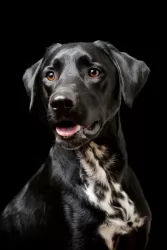 The Dalmador is a cross-breed – a mix between a Dalmation and a Labrador, and because it is a a fairly new breed you won’t find much information about the dog’s origins.
The Dalmador is a cross-breed – a mix between a Dalmation and a Labrador, and because it is a a fairly new breed you won’t find much information about the dog’s origins.
We do know that the Labrador originated in Canada and that the Dalmation comes from Croatia. Both these dog breeds have their own interesting histories. The Dalmador is a hybrid dog and isn’t a member of the American Kennel Club.
They started coming about from the 1980s when mixing one pure-breed dog with another became popular.
 Obviously the Galgos looks a lot like the Greyhound, but in some very important ways they are very different. The rear of the Galgos is higher than the front and their muscle are flatter. They are built for endurance while the Greyhound is built for speed. The Galgos is a lighter, smaller dog with larger ear on a long head. They have long tails and their chests are not deep like the Greyhounds.
Obviously the Galgos looks a lot like the Greyhound, but in some very important ways they are very different. The rear of the Galgos is higher than the front and their muscle are flatter. They are built for endurance while the Greyhound is built for speed. The Galgos is a lighter, smaller dog with larger ear on a long head. They have long tails and their chests are not deep like the Greyhounds.
The Galgo comes in smooth and rough coats and a variety of colors. The rough coat protects dogs that are in climates colder than the ones in Spain and also keeps them from injuring their skin while running. The colors include brindle, black, golden, toasted, cinnamon, yellow, red, white, white with patches, or any color as long as they have a white forehead and muzzle.
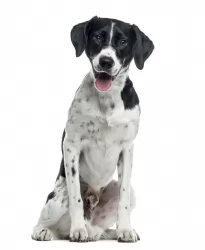 The Dalmador is a cross breed dog which comes from crossing the Labrador Retriever with a Dalmatian. The result is a muscular, well proportioned body.He has floppy ears and a long tail.
The Dalmador is a cross breed dog which comes from crossing the Labrador Retriever with a Dalmatian. The result is a muscular, well proportioned body.He has floppy ears and a long tail.
He is medium to large sized dog and can stand up to 58cm in height and weigh between 25 and 32kg. No two dogs look the same and some dogs gravitate more towards the one breed while others toward the other.
Most Dalmadors have the spotted coat, although the coat could have very visible spots or maybe just a few dots on the fur. Then again there are some Dalmadors where the coat is more of a solid color in brown or black or cream with some white patches. The double coat is short and dense and he is quite a heavy shedder.
The Dalmador is a gentle, friendly dog, making him a great family pet. You can’t really say exactly what temperament your Dalmador will have as he could inherit either the Dalmatian’s more aloof nature or he could inherit the friendly character of the Labrador.
He is quite likely to be even-tempered and is amicable with other pets in the home. He is alert too and this makes him a good watchdog. Because the Dalmador is the hybrid of two active, alert, intelligent breeds you can expect a dog which for some will be quite a handful. It is why training and socialization can be excellent for the Dalmador as it will calm him down, turning him into an obedient dog who comes and sits when told.
If you’re looking for an energetic, active and highly social dog, the Dalmador will suit an active family that can join in with all his high jinks.
 They are good with children, but you need to be careful no one gets knocked down or hurt.
They are good with children, but you need to be careful no one gets knocked down or hurt.
Stamina for running and a good record in lure coursing.
Though they can be couch potatoes like greyhounds they are better off with a fenced yard and not an apartment.
They are smart and can learn anything you want to teach them if you can keep their attention.
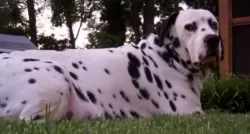 The wonderful Dalmador is such a easy-going, cheerful dog full of surprises really, as you never know which dominant traits he will inherit from either of the two dogs involved in his making.
The wonderful Dalmador is such a easy-going, cheerful dog full of surprises really, as you never know which dominant traits he will inherit from either of the two dogs involved in his making.
Friendly and social, he loves his human family and is totally loyal and loving toward them. Even tempered and faithful, if you’re looking for a wonderful 4-legged friend and companion, the Dalmador promises to make you a splendid pet.
 Being a large dog, the Galgo Espanol would normally face a high probability of hip dysplasia. Fortunately for the breed this is not true. In this respect their lightness of weight, their history as a working dog and their anatomy have protected them from it. They are however susceptible to other issues.
Being a large dog, the Galgo Espanol would normally face a high probability of hip dysplasia. Fortunately for the breed this is not true. In this respect their lightness of weight, their history as a working dog and their anatomy have protected them from it. They are however susceptible to other issues.
Malignant tumors that quickly spread throughout the body. Life threatening.
As a sighthound, the Galgo Espanol is prone to have issues anytime with anesthetics. They don’t metabolize the anesthetics like other dogs do. They will take longer to revive, and they are susceptible to hypothermia while under an aesthetic.
While running, they are prone to injuries
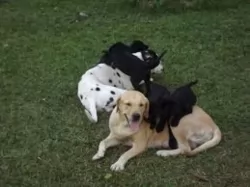 The Dalmador is a hybrid dog and they don’t experience the same health issues that the pure bred dog contends with. The Dalmador has a life expectancy of 10 to 14 years and he can reach this age if you give him all the doggy care he deserves as a 4-legged member of your family.
The Dalmador is a hybrid dog and they don’t experience the same health issues that the pure bred dog contends with. The Dalmador has a life expectancy of 10 to 14 years and he can reach this age if you give him all the doggy care he deserves as a 4-legged member of your family.
Apart from a common dog ailment – hip dysplasia, bloat and obesity are also common problems for your dog.
Bloat is a serious health condition that can actually be fatal because its a twisted stomach where trapped gas puts pressure on the diaphragm.
You will notice the swollen stomach of your pet. Larger breeds are more prone to suffer from bloat because of being deep-chested. Also known as gastric dilatation-volvulus, a vet will need to intervene with this ailment as it can be life-threatening.
 Feed your puppy a high quality dry food made for large breed dogs. Feed 3 meals a day 2.5 to 3 cups total for the day.
Feed your puppy a high quality dry food made for large breed dogs. Feed 3 meals a day 2.5 to 3 cups total for the day.
Feed your adult Galgo a high quality dry food made for large breed dogs. Feed 2 meals a day but don’t overfeed Give 4-5 cups total for the day.
They have amazing stamina and good speed. Generally good health as a breed.
He can be a couch potato indoors and runs forever outdoors. He does need daily exercise and bedrest both. The best would be if you could sprint him every day or have a small yard he can play in. They excel of course at agility and lure coursing. Keep them on a leash because if they run you will never catch them. The American Sighthound Field Association presents lure coursing events that they are eligible for. They have exceled at show competition in Europe but are not well known in the U.S.
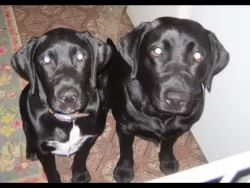 The Dalmador is a medium to large dog so you want to be feeding him one or two bowls of food a day. You want to be giving your Dalmador top-quality food to ensure good health. The lower quality foods are inclined to have ingredients in them that aren’t good for your pet.
The Dalmador is a medium to large dog so you want to be feeding him one or two bowls of food a day. You want to be giving your Dalmador top-quality food to ensure good health. The lower quality foods are inclined to have ingredients in them that aren’t good for your pet.
Always try to include some home-made food into your pet’s diet such as cooked brown rice, cooked chicken and vegetables. You can mix this into some of his dry kibble. It is important to include some raw meat into his diet from time to time as well.
Clean water must be constantly available. Without good quality food and water, you jeopardize the health of your pet.
He isn’t going to require much maintenance so a good brush twice a week will rid him of loose hairs and keep his coat shiny and glossy.
Other things to check regularly are his ears and to brush his teeth 2 or 3 times a week. Don’t neglect giving him a good amount of exercise too.